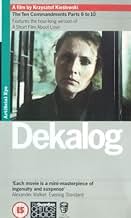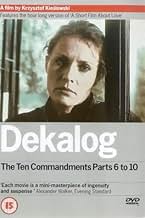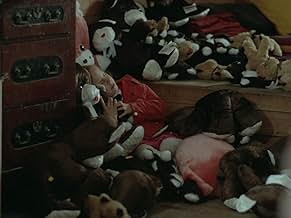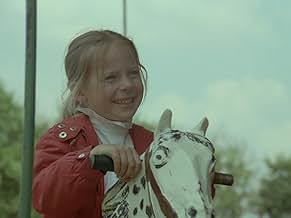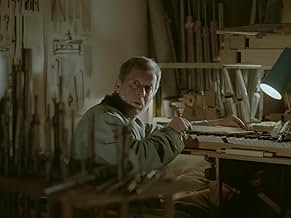Dekalog, siedem
- Episode aired Jun 15, 1990
- TV-MA
- 57m
IMDb RATING
7.8/10
4.2K
YOUR RATING
Raised as sisters, one is in fact the other's mother. Unwilling to continue living a lie, the mother tries to get her daughter back from her parents.Raised as sisters, one is in fact the other's mother. Unwilling to continue living a lie, the mother tries to get her daughter back from her parents.Raised as sisters, one is in fact the other's mother. Unwilling to continue living a lie, the mother tries to get her daughter back from her parents.
- Director
- Writers
- Stars
- Director
- Writers
- All cast & crew
- Production, box office & more at IMDbPro
7.84.1K
1
2
3
4
5
6
7
8
9
10
Featured reviews
'Dekalog': Part 7- Possession as human need and temptation and the sanctity of dominion
'Dekalog' is a towering achievement and a televisual masterpiece that puts many feature films to shame, also pulling off a concept of great ambition brilliantly. Although a big admirer of Krzysztof Kieślowski (a gifted director taken from us too early), and who has yet to be disappointed by him, to me 'Dekalog' and 'Three Colours: Red' sees him at his best.
All of 'Dekalog's' episodes have so many great things, and it is an example of none of the lesser episodes being bad. This is testament to the high quality of 'Dekalog' as an overall whole and how brilliant the best episodes are. Episode 7 may not be as good as Episodes 1, 4, 5 and 6, being not quite as eventful or quite as rich thematically, but is still terrific stuff.
Every single one of 'Dekalog's' episodes are exceptionally well made. The production values in Episode 7 are as ever atmosphere-enhancing, beautiful and haunting to look at and fascinating. Many of the images are impossible to forget and enhance the poignant atmosphere. The direction is quietly unobtrusive, intelligently paced and never too heavy, and the music is suitably intricate.
The themes and ideals are used to full potential, and the characters and their relationships and conflicts feel so real and emotionally resonant without being heavy-handed. Despite being based around one of the ten commandments, don't let that put you off, resemblance to religion is relatively scant.
It is not as rich in story as a few of the previous episodes, but the atmosphere is both harrowing and heart-rending, Episode 7 definitely being one of the most poignant 'Dekalog' episodes. The character development and interactions really fascinate and compelling in their realism. The acting is superb as to be expected, with complexity and nuances by the bucket-load.
Concluding this review, not one of the best 'Dekalog' episodes but still terrific. 9/10 Bethany Cox
All of 'Dekalog's' episodes have so many great things, and it is an example of none of the lesser episodes being bad. This is testament to the high quality of 'Dekalog' as an overall whole and how brilliant the best episodes are. Episode 7 may not be as good as Episodes 1, 4, 5 and 6, being not quite as eventful or quite as rich thematically, but is still terrific stuff.
Every single one of 'Dekalog's' episodes are exceptionally well made. The production values in Episode 7 are as ever atmosphere-enhancing, beautiful and haunting to look at and fascinating. Many of the images are impossible to forget and enhance the poignant atmosphere. The direction is quietly unobtrusive, intelligently paced and never too heavy, and the music is suitably intricate.
The themes and ideals are used to full potential, and the characters and their relationships and conflicts feel so real and emotionally resonant without being heavy-handed. Despite being based around one of the ten commandments, don't let that put you off, resemblance to religion is relatively scant.
It is not as rich in story as a few of the previous episodes, but the atmosphere is both harrowing and heart-rending, Episode 7 definitely being one of the most poignant 'Dekalog' episodes. The character development and interactions really fascinate and compelling in their realism. The acting is superb as to be expected, with complexity and nuances by the bucket-load.
Concluding this review, not one of the best 'Dekalog' episodes but still terrific. 9/10 Bethany Cox
Thou shalt not steal
Dekalog Seven isn't the strongest of the ten, but, like Dekalog Five, Kieslowski takes a fairly straightforward commandment and adds a twist to it. Sure, we may think Majka steal Ania, but, as Majka says, can you really steal something that was yours to begin with? It's an interesting question, and Kieslowski forces you to consider (And ultimately decide) who, Ewa or Majka, is really at fault for stealing Ania. But that's typical Kieslowski. To have a straightforward plot with a cut-and-dry scenario would be far too easy for him, and I've come to expect nothing less from his work. The types of questions he subtly asks the viewer are more important than any moral he could tell us because it forces us to question our own values and morals, instead of being told, and this kind of questioning is why Kieslowski and his works are so highly regarded.
Haunting
The young woman in the film has had a child that has been raised by her mother and father. They are judgmental because she was immature and, in their eyes, irresponsible. It is obvious that her stock is greatly diminished at home. So one day, she waits till a children's' play is over and kidnaps her daughter. This is a no win situation. The fact is she is not capable of keeping the child healthy and happy. They are on the run but have no real place to go. This is a sad tale of looking for some kind of independence when that boat has left the dock.
Dekalog 7
The template for Dekalog is that we enter a life with its anxieties (a dying husband on a hospital bed, a husband who disappeared on Christmas Eve) and at some point the narrative surface gives way and reveals a more fluid, more interdepentent life of suffering beneath.
This is evident here in a child sister abducted (after a theatric performance no less, after the swirl of fiction) and by next morning she has become a daughter. We explore a bit more but it never amounts to more than drama about the choices we have to make.
The Kieslowski I like, as I am discovering with these Dekalog viewings, is that way he has of visually slipping ahead and back. This is on the more typical end of the spectrum, all about moral anxiety and doublebinds. The ending is both emotional and convenient, poured on as syrup instead of laid out as vision.
This is evident here in a child sister abducted (after a theatric performance no less, after the swirl of fiction) and by next morning she has become a daughter. We explore a bit more but it never amounts to more than drama about the choices we have to make.
The Kieslowski I like, as I am discovering with these Dekalog viewings, is that way he has of visually slipping ahead and back. This is on the more typical end of the spectrum, all about moral anxiety and doublebinds. The ending is both emotional and convenient, poured on as syrup instead of laid out as vision.
Stealing as a metaphor
The film can be evaluated at several levels. It offers several layers of meaning, teasing the viewer as it progresses.
Kidnapping your own daughter from the ownership of your mother is a bizarre situation. Two women want to own a young child--the biological mother and the grandmother who yearned to "suckle" another. Interestingly the script looks at three generations of the same sex. The males seem to be the outsiders, yet balanced in comparison to the females in the movie.
"Thou shall not steal" is the commandment that is apparently broken. The film leads you to believe that the mother has "kidnapped" her own child. The film seems to argue quite elegantly that the real thief is the grandparent not the "kidnapping" mother. The "kidnapping" is symbolic--the police is mentioned not seen. The law presented in the film is moral one, not a civil one. In the end, it is the natural affection the child yearns for that is stolen, not by an individual but by circumstances (the state?).
Is this a veiled criticism of Poland, the effect of communism on the young emerging democracy? What would have happened if the "stealing" within and without the movie did not take place? The film begins with the sound of the child crying that can be heard outside the walls of the house; the film ends with the silent cry of the child in the open, without walls and yet the cry cannot be heard, only seen (harking back to Rod Steiger's silent cry at the end of "The Pawnbroker"). Is fleeing to Canada (read: Western capitalism) a better option than staying back in the overgrown, ummowed gardens (with dilapidated merry-go-rounds) of Poland? Is making teddy bears a better life than taking care of your child? Is he making an argument for "stealing" becoming honorable for the cause of freedom? The film leaves you with more questions than answers, yet providing a mature level of entertainment for the intelligent viewer.
I had the good fortune to have met Kieslowski in 1982 after he made "Camera Buff" in Bangalore, India, a film that did not have the sparkle and maturity of his later works. Little did I imagine that he would go on to make the "Three colors" trilogy and "Decalogue". These later works make you wonder at the ambiguity of his later work--the beguiling smile of a Mona Lisa as he deals with religion, politics, morals with a twinkle in his eye.
This episode may be seem to present an unusual story but what a masterful way to present it. Innocence is limited to one character in the entire film: the child. Just one word describes the episode, brilliant in philosophy and in cinema, thanks partly to cinematographer Dariusz Kuc.
Theologically analyzed, the film offers more for reflection. The subject of stealing goods is arguably covered by the 10th commandment "thou shalt not covet thy neighbours goods" and the seventh commandment is often subtly interepreted as "thou shalt not kidnap" (read Wikepedia on "Ten Commandments" quoting a Jewish Rabbi, Rashi). This is probably the reason why the film is all about kidnapping and not about stealing goods which is dealt by the director and screenplay writer in Decalogue 10--which is all about stealing goods and about "coveting thy neighbor's goods"--confusing many critics who missed the distinction being made on screen. This is a fine example of cinema that invites you to read more after seeing the film (and revise your own judgement). Pieseiewicz and Kiesolwski had done their homework!
Kidnapping your own daughter from the ownership of your mother is a bizarre situation. Two women want to own a young child--the biological mother and the grandmother who yearned to "suckle" another. Interestingly the script looks at three generations of the same sex. The males seem to be the outsiders, yet balanced in comparison to the females in the movie.
"Thou shall not steal" is the commandment that is apparently broken. The film leads you to believe that the mother has "kidnapped" her own child. The film seems to argue quite elegantly that the real thief is the grandparent not the "kidnapping" mother. The "kidnapping" is symbolic--the police is mentioned not seen. The law presented in the film is moral one, not a civil one. In the end, it is the natural affection the child yearns for that is stolen, not by an individual but by circumstances (the state?).
Is this a veiled criticism of Poland, the effect of communism on the young emerging democracy? What would have happened if the "stealing" within and without the movie did not take place? The film begins with the sound of the child crying that can be heard outside the walls of the house; the film ends with the silent cry of the child in the open, without walls and yet the cry cannot be heard, only seen (harking back to Rod Steiger's silent cry at the end of "The Pawnbroker"). Is fleeing to Canada (read: Western capitalism) a better option than staying back in the overgrown, ummowed gardens (with dilapidated merry-go-rounds) of Poland? Is making teddy bears a better life than taking care of your child? Is he making an argument for "stealing" becoming honorable for the cause of freedom? The film leaves you with more questions than answers, yet providing a mature level of entertainment for the intelligent viewer.
I had the good fortune to have met Kieslowski in 1982 after he made "Camera Buff" in Bangalore, India, a film that did not have the sparkle and maturity of his later works. Little did I imagine that he would go on to make the "Three colors" trilogy and "Decalogue". These later works make you wonder at the ambiguity of his later work--the beguiling smile of a Mona Lisa as he deals with religion, politics, morals with a twinkle in his eye.
This episode may be seem to present an unusual story but what a masterful way to present it. Innocence is limited to one character in the entire film: the child. Just one word describes the episode, brilliant in philosophy and in cinema, thanks partly to cinematographer Dariusz Kuc.
Theologically analyzed, the film offers more for reflection. The subject of stealing goods is arguably covered by the 10th commandment "thou shalt not covet thy neighbours goods" and the seventh commandment is often subtly interepreted as "thou shalt not kidnap" (read Wikepedia on "Ten Commandments" quoting a Jewish Rabbi, Rashi). This is probably the reason why the film is all about kidnapping and not about stealing goods which is dealt by the director and screenplay writer in Decalogue 10--which is all about stealing goods and about "coveting thy neighbor's goods"--confusing many critics who missed the distinction being made on screen. This is a fine example of cinema that invites you to read more after seeing the film (and revise your own judgement). Pieseiewicz and Kiesolwski had done their homework!
Did you know
- TriviaArtur Barcis, who plays a recurring role in most episodes of Dekalog, was meant to play a man at the railway station, but did not appear in this episode due to technical difficulties.
- ConnectionsReferenced in The Simpsons: Lisa's First Word (1992)
Details
Contribute to this page
Suggest an edit or add missing content


